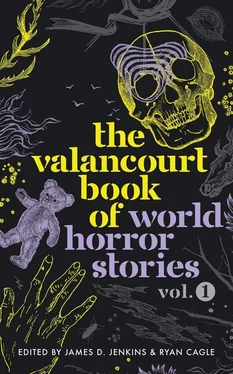It had already been a couple of weeks since Carlos had returned from his first study trip. The second of September, the date she had colored in red on the calendar in her bedroom and which now appeared increasingly remote and impossible. She remembered him at the foot of the stairs of the British Airlines jumbo jet, waving his arm, and she saw herself jumping enthusiastically on the airport terrace, amazed that at eighteen he could still have grown even taller, returning his kisses and greetings, pushing her way through the crowd to welcome him in the lobby. Carlos had returned. A little thinner, quite a bit taller, and noticeably pale. But Julia found him even more handsome than when he left and paid no attention to her mother’s comments about the poor English food or the unmatched excellence of the Mediterranean climate. Nor, when they’d gotten in the car and her brother seemed happy at the prospect of enjoying a few weeks in the beach house and their father pestered him with innocent questions about the little blond girls of Brighton, did Julia laugh at the family’s wisecracks. She was too excited, and her head was buzzing with plans and projects. The following day, when her parents stopped overwhelming him with questions, she and Carlos would recount the summer’s events to each other in secret, on the roof like always, their swinging legs hanging over the eaves, just like when they were little and Carlos used to teach her how to draw and she used to show him her sticker collection. When they got to the garden, Marta came out to meet them, giving little jumps, and Julia marveled a second time at how much her brother had grown. ‘At eighteen,’ she thought, ‘how absurd!’ But she didn’t say a word.
Carlos had remained lost in thought, contemplating the house’s exterior as though he were seeing it for the first time. He held his head tilted toward the right, his brow furrowed, his lips contracted in a strange grimace that Julia could not interpret. He remained motionless for a few moments, looking toward the housefront with the eyes of one who is hypnotized, oblivious to the movements of the family, the hustle and bustle of suitcases, the proximity of Julia herself. Afterwards, without hardly changing his position, he leaned his head on his left shoulder, his eyes reflected astonishment, the strange grimace of his mouth gave way to an unequivocal expression of fatigue and depression, he ran his hand along his forehead and, concentrating his gaze on the ground, he dejectedly crossed the paved garden path.
During dinner, their father continued to take an interest in his conquests, and their mother went on worrying about his bad complexion. Marta told a couple of jokes that Carlos received with a smile. He seemed tired and sleepy. The journey, perhaps. He kissed his family goodnight and retired to bed.
The following day Julia awoke very early, reviewed the list of reading recommendations Carlos had given her when he left, gathered up the notebooks in which she had jotted down her impressions, and climbed up to the roof. After a while, tired of waiting, she jumped down to the rooftop terrace. Her brother’s window was half closed but it didn’t appear there was anyone inside the room. She leaned out over the balustrade and looked towards the garden.
Carlos was there, in the same position as the night before, contemplating the house with a mixture of astonishment and dismay, leaning his head first to the right, then to the left, fixing his gaze on the ground and dejectedly crossing the paved path that separated him from the house. It was then that Julia understood, all of a sudden, that something was happening to her brother.
The ‘doomed love’ hypothesis was gaining ground at the tense household lunches. A blond, pale young English girl from Brighton. The melancholy of first love, the sadness of long distance, the apathy with which youths of his age usually regard everything unconnected to the object of their passion. But that was at first. When Carlos was merely sullen and aloof, being startled by any question whatsoever, diverting his eyes, refusing little Marta’s cuddles. Maybe she should have acted decisively then. But now Carlos had just said, ‘Come in. It’s open,’ and, plucking up her courage, she had no alternative but to push open the door.
At first she couldn’t discern anything but a suffocating heat and a labored, plaintive breathing. After a while she was able to distinguish between the shadows: Carlos was seated at the foot of the bed and the only glimmers of light that had been able to penetrate his fortress seemed to be concentrated in his eyes. Or were they his eyes? Julia opened one of the window shutters slightly and gave a relieved sigh. Yes, that despondent boy, hidden behind impregnable sunglasses, his forehead sprinkled with gleaming droplets of sweat, was her brother. Except that she now found his paleness too alarming, his attitude too inexplicable, to go on justifying him in the eyes of the family.
‘They’re going to call a doctor,’ she said.
Carlos was unfazed. He went on for several minutes with his head bent toward the floor, knocking his knees together, playing with his fingers as if he were performing a children’s song on the keyboard of a nonexistent piano.
‘They want to force you to eat . . . to leave this filthy room for good.’
Julia thought her brother shuddered. ‘This room,’ she thought, ‘what is it that’s making him stay in this room so long?’ She looked around and was surprised that it was not as untidy as she might have expected. Carlos, from the bed, was breathing heavily. ‘He’s going to speak,’ she told herself, and, suffocated by the stifling atmosphere, she timidly pushed open one of the shutters and half opened the window.
‘Julia,’ she heard, ‘I know you’re not going to understand anything of what I might tell you. But I have to talk with someone.’
A glint of pride lit up her eyes. As in times past, Carlos was going to make her a party to his secrets, turn her into his most faithful ally, ask her for help that she would rush to give him. Now she understood that she had acted rightly in standing guard beside that shadowy room, acting like a ridiculous amateur spy, enduring silences, measuring the dimensions of the lonely, scorching hot rooftop over and over again. Because Carlos had said: ‘I have to talk with someone . . .’ And she was there, beside the half-opened window, ready to attentively take note of everything he might decide to confide to her, not daring to interrupt, not caring that he spoke in a low voice, difficult to make out, as if he feared to hear his own lips utter the secret reason for his unease. ‘It all comes down to a question of . . .’ Julia could not make out the final word muttered in a whisper, but she preferred not to interrupt. She took a crumpled cigarette from her pocket and offered it to her brother. Carlos, without looking up, refused it.
‘It all started in Brighton, on a day like so many others,’ he continued. ‘I lay down in bed, closed the window to forget about the rain, and I slept. That was in Brighton . . . Did I already say that?’
Julia assented by clearing her throat.
‘I dreamt that I had passed my exams with flying colors, that they loaded me down with diplomas and medals, that all of a sudden I wanted to be here with all of you and, without thinking twice, decided to show up unannounced. Then I got on a train, an incredibly long and narrow train, and arrived here almost without realizing it. “It’s a dream,” I told myself and, extremely pleased, I did everything possible not to wake up. I got off the train and set off towards the house, singing as I went. It was the early hours of the morning and the streets were deserted. Suddenly I realized that I had forgotten my suitcase in the compartment, the gifts I had bought for you all, the diplomas and medals, and I had to return to the station before the train left again for Brighton. “It’s a dream,” I told myself again. “Imagine that I’ve sent the baggage by mail. Let’s not waste time. Worst case scenario, the plot will thicken later.” And I stop in front of the house.’
Читать дальше











